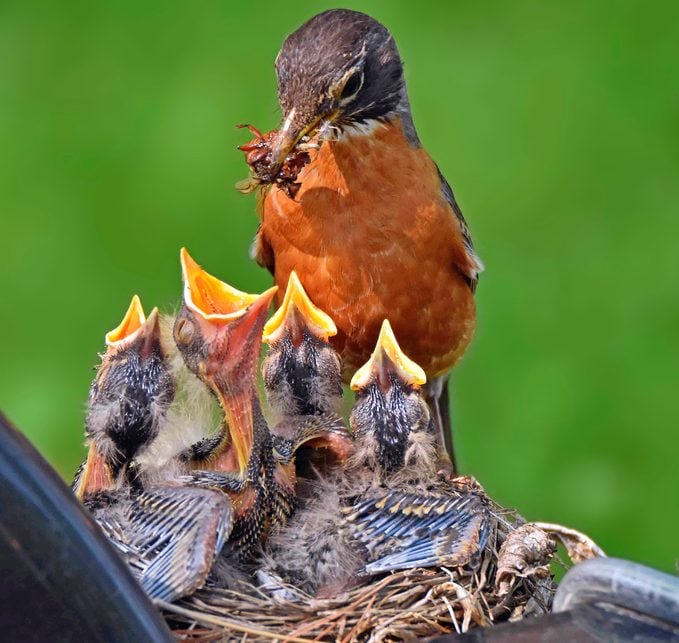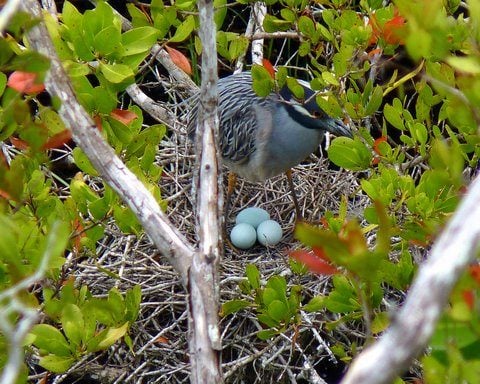Watch Baby Birds With Nest Cams and in Your Backyard
Updated: Jun. 24, 2020
After the excitement of viewing nest cams, you may want to observe nesting birds in your yard. Before you do, learn tips to keep birds safe and undisturbed.
Our editors and experts handpick every product we feature. We may earn a commission from your purchases.

“Nest Cams” are all the rage these days. Amazing web cams around the country have been set up to allow people worldwide to observe the behavior of nesting great blue herons, bald eagles, hummingbirds, owls, and more. After the excitement of viewing this behavior on the web, you may want to head out to observe nesting birds in your own yard and beyond. Before you do so, though, learn a few tips to be sure you leave the birds happy and undisturbed as they go about their daily lives.
These tips are adapted from Cornell Ornithology Lab’s NestWatch Nest Monitor Code of Conduct.
Don’t Startle Birds
This can cause them to knock eggs or nestlings off the nest as they fly away, or even abandon a nest altogether. If a parent is on a nest, wait a few minutes to see if they leave on their own—that’s the best time to get a little closer and observe. These are the stages of a baby bird’s life.
Never Handle Birds, Nests, or Eggs
They’re fragile and easily damaged. Use binoculars or the zoom lens on your camera to get a close-up look. Check out this cool motion-activated outdoor camera from Audubon. Check out these super cute photos of baby birds.
The Best Time to Visit is Afternoon
Don’t visit nests first thing in the morning. Mornings can be chilly, and eggs or nestlings left uncovered by a disturbed parent bird can get cold and suffer damage. Don’t visit nests at dusk or at night, either. This is when females return for the night, and you don’t want to scare them off. Owls are the exception, as owls leave the nest in the evening. Here’s how to attract owls to nest in your yard.

Avoid Nests When Eggs are Laid and After Nestlings Hatch
These are crucial times for successful nesting, and startling the parent birds at this time could cause them to desert the nest.
What if I Find a Fallen Nest, Egg or Baby Bird?
In most cases, if you find a bird nest, it’s really best to let nature take its course. Nests knocked from trees by wind or storms may not have been securely built in the first place. Eggs fallen to the ground may be there for a reason—they could be infertile or belong to a different “nest-stealing” species. If you do want to help, though, here are some tips:
- If you find a fallen nest on the ground after a storm, with or without intact eggs, you can try placing it back up into a tree nearby. It’s possible the birds may return to it, but don’t be surprised if they simply move on and try again. Nature is very adaptable.
- If you find a fallen egg on the ground near a nest, you can pick up and place it back in the nest. Don’t worry about the myth that your scent will keep the birds from returning – birds have poorly developed senses of smell. Do be aware, though, that birds sometimes push eggs from their nests on purpose. If you continue to find them on the ground, just leave them there and let nature take its course.
- If you find a baby bird on the ground, don’t pick it up immediately. Just observe it for a few minutes. It may be a fledgling, out of the nest and learning to fly. If it’s clearly a helpless nestling, you can pick up and put it back in the nest (again, your hands are fine), but remember that baby birds falling from nests are also a part of nature weeding out the weak to let the strongest survive.
